Health & Hygiene
Dental Hygiene
Introduction
Menu
The best way to ensure a clean and healthy smile is brushing and flossing. Food particles can accumulate on teeth and turn into plaque, eventually leading to gum disease, tooth decay and even tooth loss.
Good dental hygiene can help avoid costly treatment in the future. Click on the buttons to the left to learn more about how to maintain your healthy smile.
- Step 1

Use a soft-bristled toothbrush and a small strip of fluoridated toothpaste. Holding the brush at a 45-degree angle, move the brush in small, circular motions across the teeth.
- Step 2
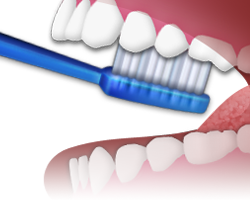
Carefully brush the chewing surfaces of your teeth, making sure to clean the back teeth and between the teeth.
- Step 3
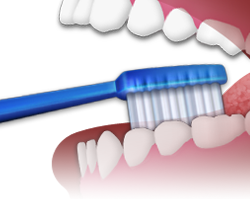
Use the same circular motion to clean the inside of the upper and lower teeth.
- Step 4
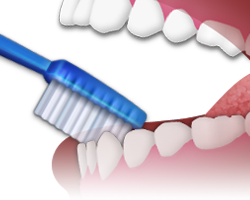
Brush the inside of the top and bottom front teeth by angling the head of the toothbrush up-and-down and brushing in a small, circular motion.
- Step 5
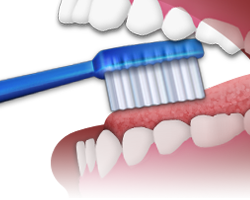
Finish by brushing your tongue and the roof of your mouth before rinsing.
- Step 1
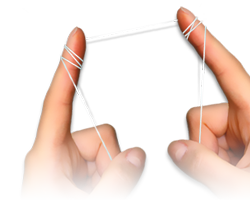
Floss at least once a day. Pull a small length of floss from the dispenser and wrap the ends tightly around your middle fingers.
- Step 2
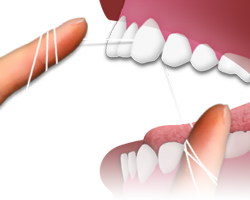
Gently guide the floss between all teeth to the gum line, including the back teeth, to remove any food particles or plaque.
- Step 3
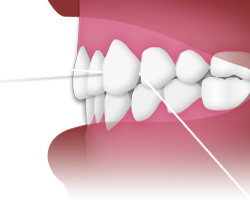
Unwrap clean floss from around your fingers as you go, so that you have used the floss from beginning to end.
- Step 1
- Step 2
- Step 3

A healthy, well-balanced diet can minimize or even completely prevent cavities and other dental problems. Limit your intake of sugary and starchy foods like candies, cookies, chips and crackers. Healthier foods, such as vegetables, low-fat yogurt and cheeses, are not only better for your overall health, but they can promote stronger, healthier teeth as well.

You should visit your general dentist twice a year (once every six months). In order to maintain a healthy smile, it is vital to have professional cleanings and regular check-ups. Your dentist will examine your teeth and provide an evaluation of existing dental problems and proposed treatment. If you have a dental emergency, you should call your dentist immediately.
Oral Cancer Screening
Oral cancer is one of the most under-discussed but prevalent forms of cancer. In fact, the American Cancer Society has recently released information showing that, while incidents of cancers overall have reduced in the United States, the occurrences of oral cancers are actually increasing, as is its mortality rate.
With proper screening and early diagnosis, the severity of oral cancer drops significantly. But as with most forms of cancer, being able to detect the cancer in an early stage is crucial. That's why our office uses advanced oral cancer screening equipment, to be able to detect and screen for the lesions that indicate possible oral cancer easily and accurately. Using specialized lights and optics, your dentist is able to conduct an oral cancer screening that can detect lesions that are invisible to the unaided human eye. These screenings are fast and completely comfortable - and best of all, they are the best possible way to ensure that your mouth is healthy and cancer-free!
We recommend an annual oral cancer screening for our patients, particularly if you:
- Are above the age of 30
- Use tobacco products, or have used them in the past 10 years
- Consume an average of 1 alcoholic drink or more per day
- Have been previously diagnosed with any form of cancer
